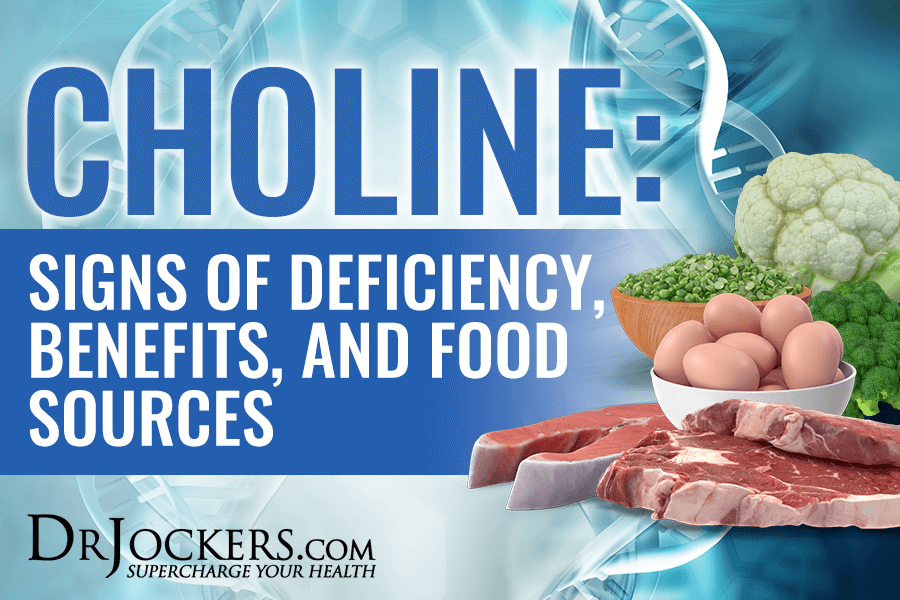 Choline: Signs of Deficiency, Benefits, and Food Sources
Choline: Signs of Deficiency, Benefits, and Food Sources
Choline is an essential nutrient for your body’s normal function and health, yet it’s rarely talked about. It is a water-soluble compound that is critical for your brain development, nervous system function, muscle movements, metabolic function, skin health, and cellular health. It is classified as vitamin B4 and humans can synthesize choline in small amounts, but it is an essential nutrient and must be consumed in the diet to maintain health
Choline deficiency may lead to fatigue, memory loss, cognitive decline, mood disorders, muscle aches, and other symptoms. Improving your choline levels is critical for your health and today I want to offer some tips on how to do that.
In this article, you will learn what choline is. I will go over the key functions and will discuss the signs and symptoms of choline deficiency. You will learn about the key benefits of choline and the risk factors for a deficiency. I will also share the recommended levels and best food sources for this important nutritional compound.
You will understand the connection between the PEMT gene and choline. You will also learn about the connection between gut health and bioavailable choline. I will explain the role of betaine and will recommend the 3 best supplemental sources to improve your choline levels and support your health.
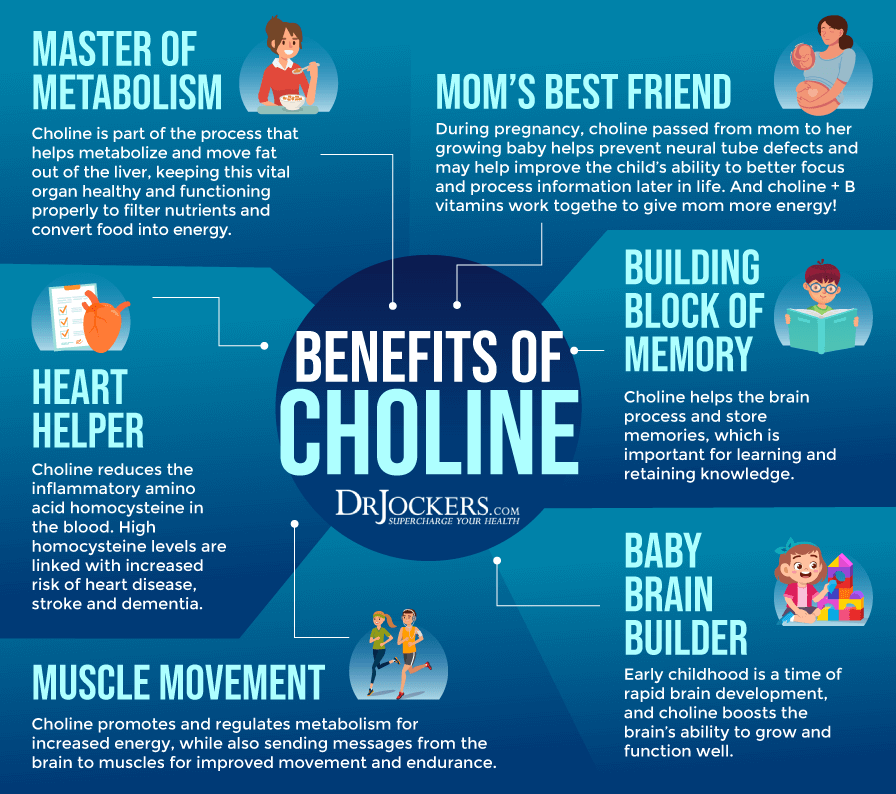
What is Choline
Choline is an essential nutrient that’s necessary for your body’s normal function and health (1). It is not a mineral or vitamin but an organic, water-soluble compound. It has some similar functions to vitamin B. It’s important for your muscle movements and health, brain development, nervous system function, metabolic function, skin health, and cellular health.
Your liver can make some choline but it’s not enough. You have to meet most of your needs through your diet. Unfortunately, according to the 2003 – 2004 National Health and Nutritional Examination (NHANES) survey published in the Federal of American Societies for Experimental Biology (FASEB) Journal, only 10 percent of people meet their choline needs in the US (2). This means that 90 percent of the population is dealing with some level of deficiency.
This can be particularly problematic during pregnancy. Choline is very important for the baby’s growth and development during pregnancy. According to a 2002 study published in the Archives of Physiology and Biochemistry, the amniotic fluid protecting the baby has 14 times higher levels of choline than the blood of the mother (3). Yet, according to a 2014 study published in Public Health and Nutrition, about 90 to 95 percent of pregnant women don’t meet their needs during pregnancy (4).
As you will learn later, choline plays an important role in all people, not just pregnancy. A deficiency can lead to a series of unwanted symptoms and improving your levels is crucial.
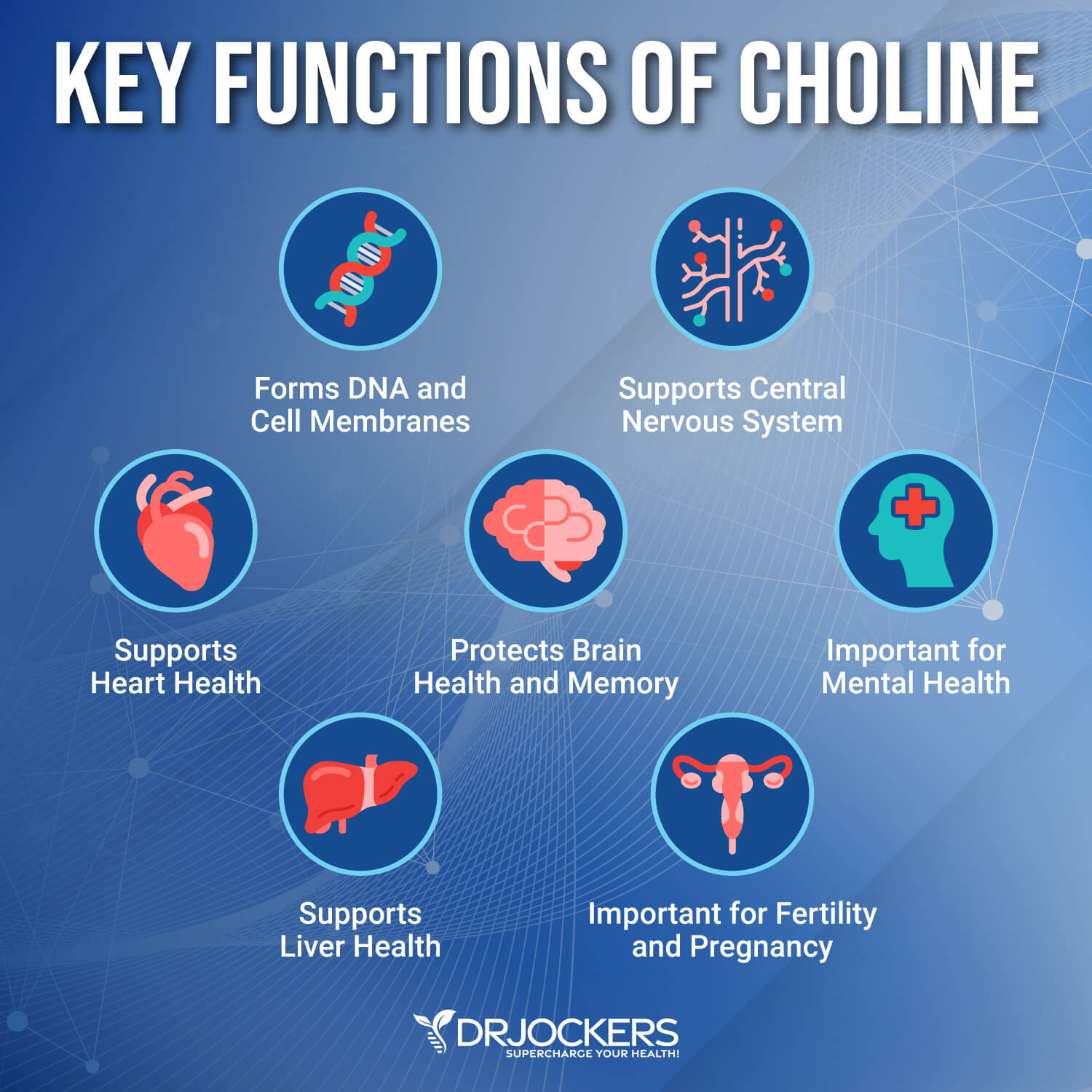
Key Functions of Choline
Choline plays several key functions in your body, including:
- Cell structure: According to a 2011 review published in the Journal of Inherited Metabolical Disease, choline is necessary to create fats that help to support the structure of your cell membranes (5).
- Cell messaging: According to a 2019 study published in Cell Reports, choline is necessary for cellular messaging (6). It helps to make compounds that work as cell messengers.
- Fat transportation and metabolism: According to a 2003 study published in the Journal of Biology Chemistry, choline helps to remove cholesterol from your liver (7). Choline deficiency may lead to cholesterol and fat buildup in your liver.
- DNA synthesis: Just like vitamin B12 and folate, choline is also necessary for DNA synthesis. According to a 2012 review published in Mutation Research, a deficiency may lead to DNA strand breaks and epigenetic changes (8).
- Nervous system health: Choline helps to make acetylcholine, a neurotransmitter essential for memory, heartbeat, muscle movement, and other functions. According to a 2018 review published in Nutrition Today, choline is essential for brain and nervous system health, cognition, memory, and mental health (9).
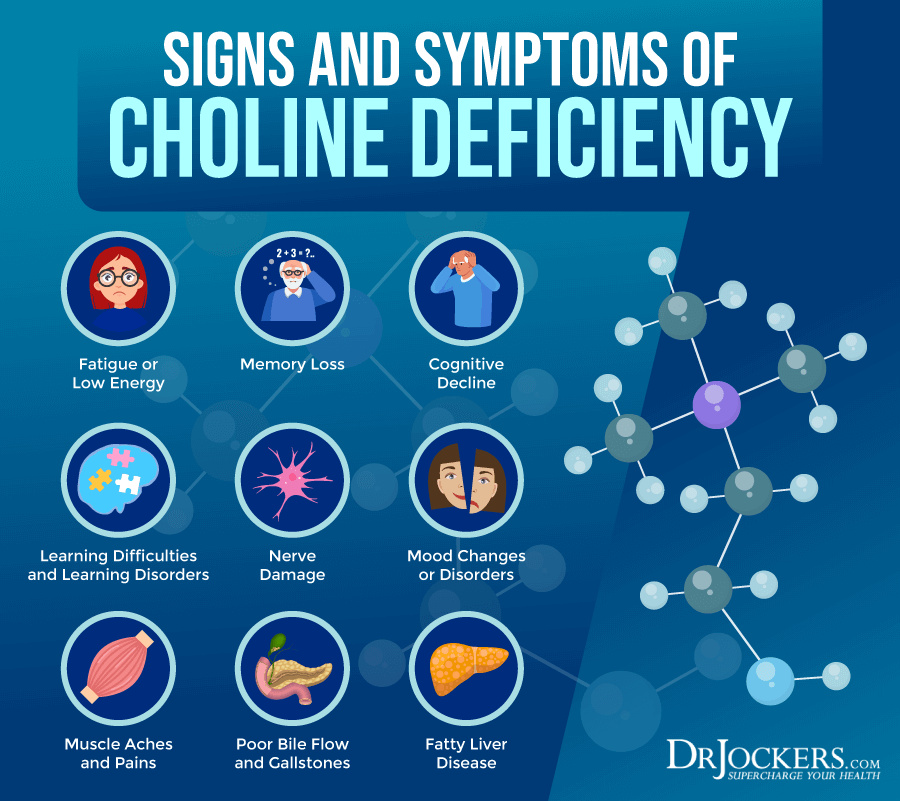
Signs & Symptoms of Choline Deficiency
Signs and symptoms of choline deficiency may include:
- Fatigue or low energy
- Memory loss
- Cognitive decline
- Learning difficulties and learning disabilities
- Nerve damage
- Mood changes
- Mood disorders
- Muscles aches and pains
-
Poor Bile Flow and Gallstones
-
Fatty Liver Disease
Risk Factors for Deficiency
Certain populations are at a higher risk for choline deficiency. Populations that are at a higher risk for developing choline deficiency include:
- Endurance athletes that participate in long endurance sports, such as marathons or Ironman competitions (10)
- Excessive alcohol intake (11)
- Postmenopausal women and women with low estrogen levels (12)
- Pregnant women (13)
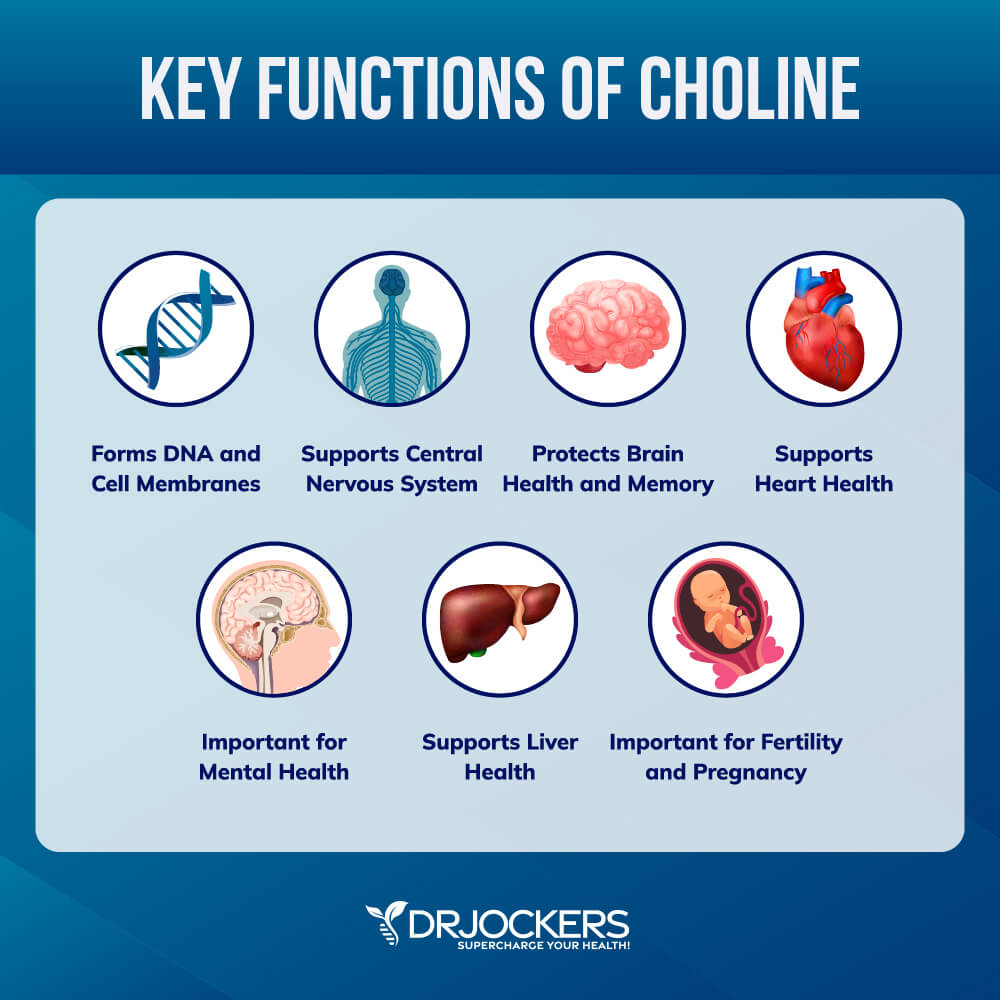
Key Benefits of Choline
Choline is an essential nutrient your body needs for health and function. Let’s look at the key benefits of this important compound.
Forms DNA and Cell Structures
One of the main functions of choline is allowing your body to absorb fat. This fat then can be used to make cell membranes and cell structures. According to a 1995 review published in Methods and Findings in Experimental and Clinical Pharmacology, without proper levels of choline, your cells are unable to keep their structure and signal messages between each other across your body (14).
Choline is also essential for gene expression and DNA. Just like with folate, your body uses choline to make genetic material. According to a 2012 review published in Mutation Research, a deficiency may cause DNA strand breaks and epigenetic changes (8).
Supports Central Nervous System
Choline is also critical for your central nervous system, nerve signaling, the structural integrity of neural membranes, and cognitive function. According to a 2011 study published in the American Journal of Clinical Nutrition, choline may help cognitive function (15).
Choline also serves as a precursor to acetylcholine and other neurotransmitters that support healthy nerve and muscle function and nerve signaling. According to a 2018 review published in Nutrition Today, choline is essential for brain and nervous system health, cognition, memory, and mental health (9). Acetylcholine is essential for learning, memory, and mood. A deficiency may lead to poor concentration, cognitive impairment, and mood changes.
Protects Brain Health and Memory Loss
As I said, choline is critical for cognition and memory. This is particularly important as you age as it may play a role in reducing the risk of memory loss, dementia, and other issues connected to cognitive decline. As you become older, your brain loses some of its elasticity. Choline and acetylcholine play an important role in maintaining brain elasticity and reducing elasticity loss.
According to a 2018 review published in Nutrition Today, choline is essential for cognition and memory function (9). According to a 2011 article published in Science Translational Medicine, acetylcholine may help to reduce the risk of cognitive decline and Alzheimer’s (16).
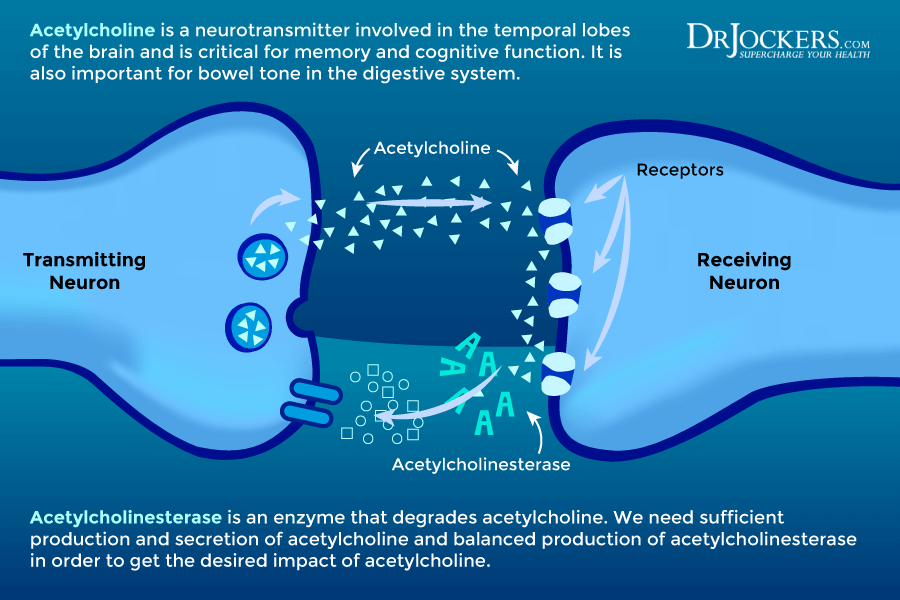
Supports Heart Health
Choline is also critical for your heart health. Choline and folate help the conversion of homocysteine. Homocysteine is an amino acid that you acquire from meat and other protein sources. High levels have been associated with heart disease and blood vessel diseases.
By converting homocysteine, choline reduces the accumulation of fat, thus reducing your risk of having a heart attack. According to a 2005 clinical trial published in the American Journal of Clinical Nutrition, choline deficiency is linked to increased homocysteine levels, which may increase your risk of heart disease (17). Moreover, according to a 2018 study published in Nutrients, choline in eggs may support healthy cholesterol levels (18).
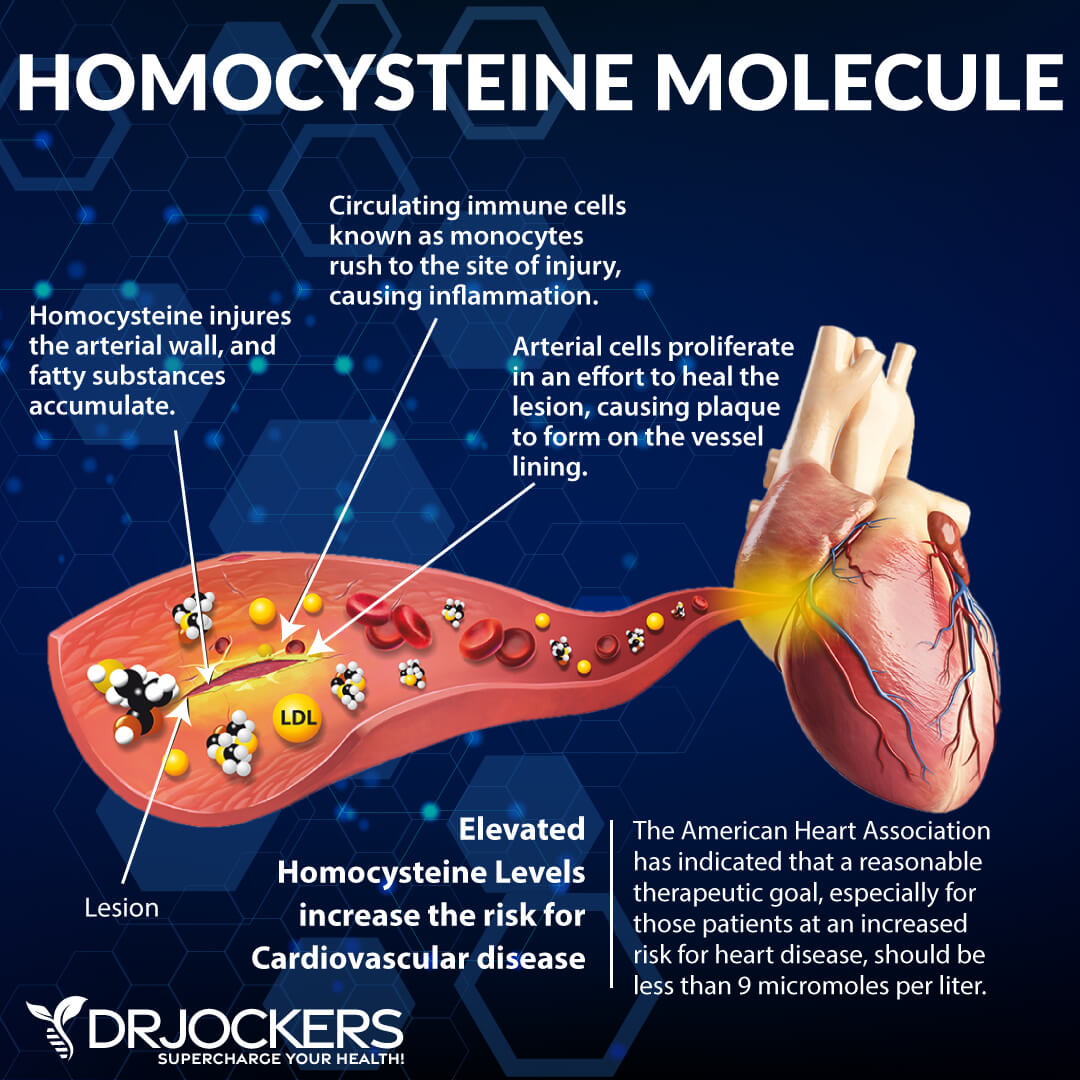
Important for Mental Health
Choline is also essential for your mental health. As you know, it serves as a precursor to acetylcholine and other neurotransmitters that support healthy nerve function and nerve signaling. According to a 2018 review published in Nutrition Today, choline is essential not only for cognition and memory, but mental health and nervous system health (9).
According to a 2020 study published in Pediatric Investigation, it may help to improve the mental health of children when used as a prenatal supplement (19). It may reduce the risk of developing autism, schizophrenia, and other mental health issues.
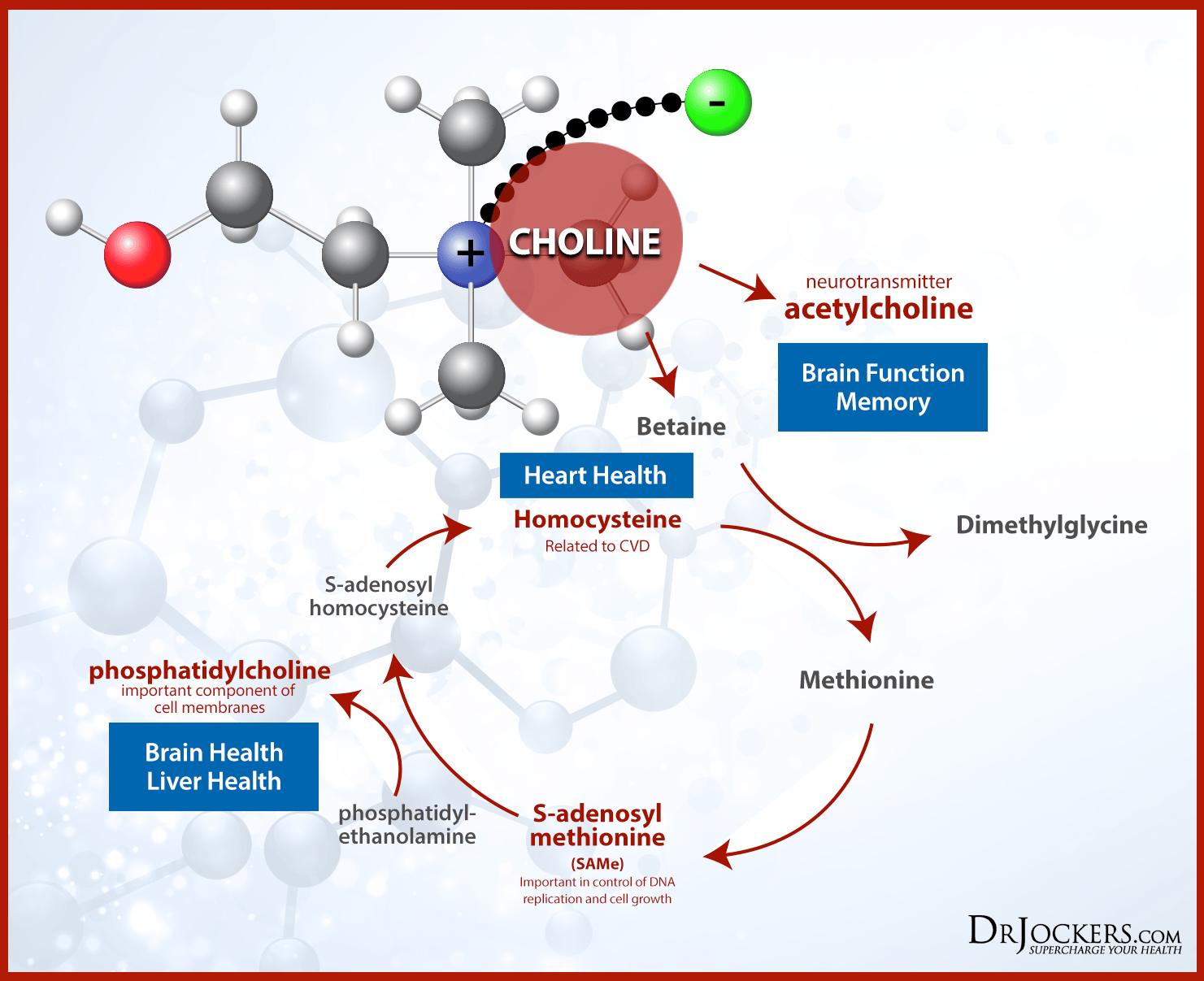
Supports Liver Health
Choline is also important for your liver health. It may help to maintain healthy liver function. It may also reduce the risk of developing fatty liver disease and other liver damage.
A 2013 review published in Current Opinions in Clinical Nutrition and Metabolic Care has found that choline deficiency may increase the risk of fatty liver disease, fibrosis, and hepatocarcinoma (20).
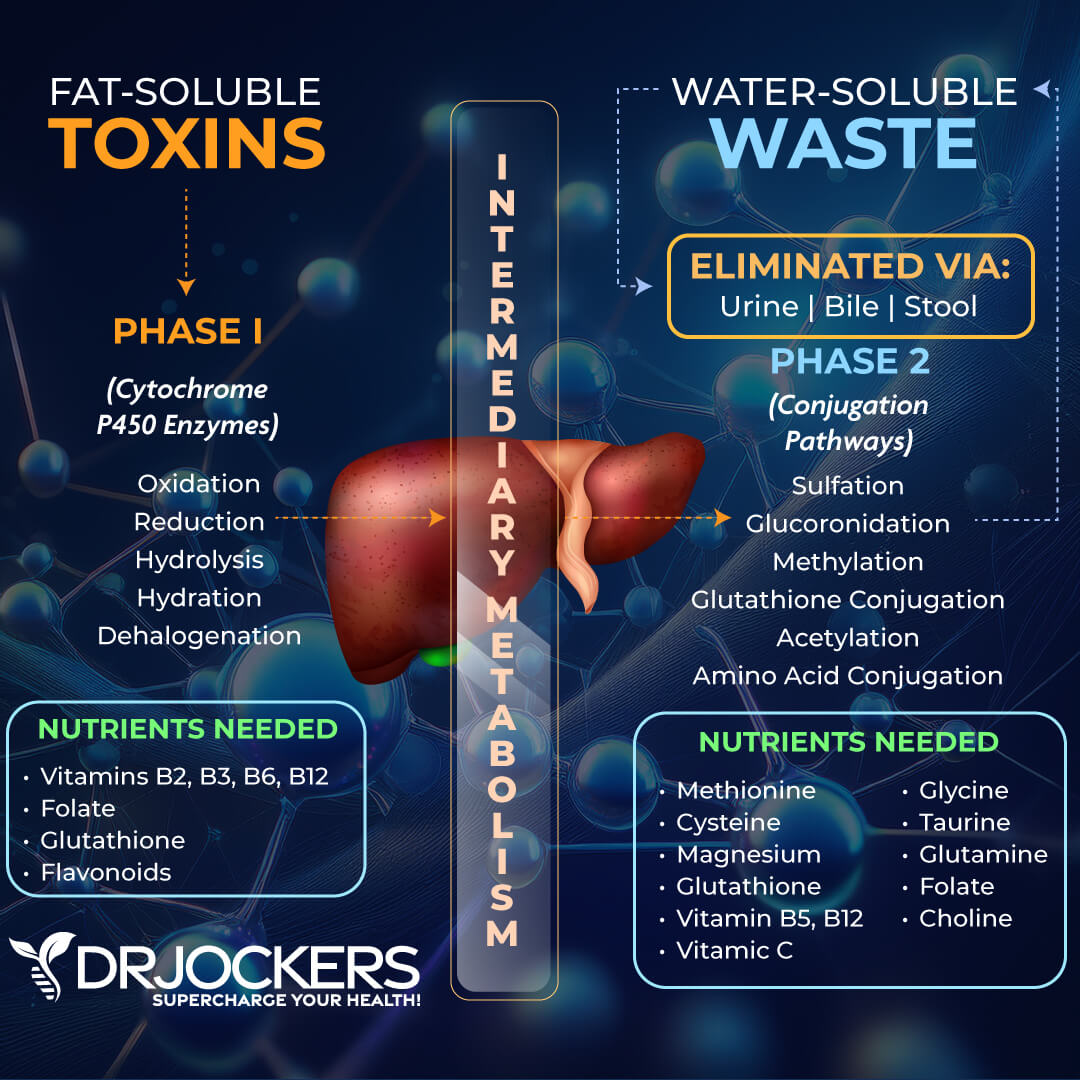
Important for Fertility and Pregnancy
As we discussed earlier in this article, choline is critical for a healthy pregnancy. It should be an important part of the diet of any pregnant woman or someone who is trying to conceive. According to a 2018 study published in the Journal of Pediatrics, higher levels of choline in the mother showed protective mechanisms for the baby’s development during pregnancy (21).
According to a 2004 review published in the Journal of American College of Nutrition, choline is a critical nutrient for brain development and brain health (22). It is essential for developing healthy brain functioning and reducing the risk of brain abnormalities and developmental issues. Since breastmilk is the source of a newborn’s growth and development, choline is also important during the breastfeeding period for the baby’s proper development.
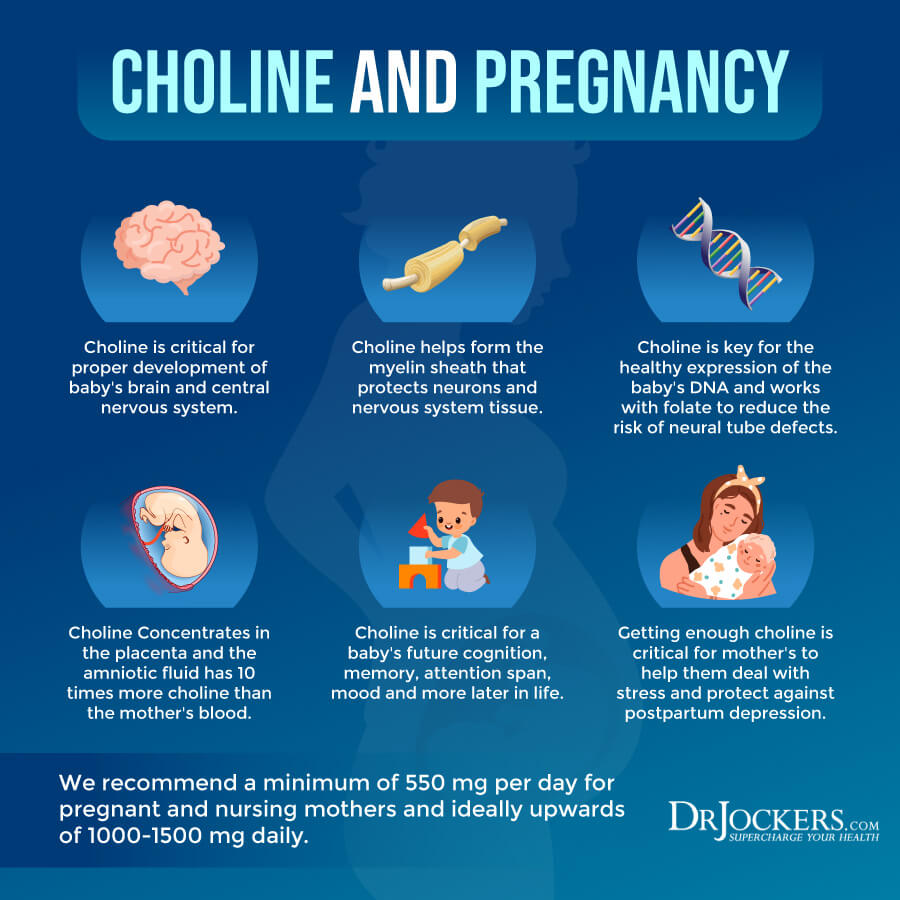
RDA Levels for Choline
A Reference Daily Intake (RDI) or Recommended Dietary Allowance (RDA) for choline has not yet been determined. However, the value for Adequate Intake (AI) set by the Institute of Medicine offers us guidance. RDA refers to an average daily intake of nutrients to meet requirements for healthy individuals. AI refers to an intake that helps to support nutritional adequacy (23, 24).
AIs for choline are the following:
- Birth to 6 months: 125 mg/day for males and 125 mg/day for females
- 7 to 12 months: 150 mg/day for male and 150 mg/day for females
- 1 to 3 years: 200 mg/day for males and 200 mg/day for females
- 4 to 8 years: 250 mg/day for males and 250 mg/day for females
- 9 to 13 years: 375 mg/day for males and 375 mg/day for female
- 14 to 18 years: 550 mg/day for males, 400 mg/day for females, 450 mg/day during pregnancy, and 550 mg/day during breastfeeding
- 19+ years/adults: 550 mg/day for males, 425 mg/day for females, 450 mg/day during pregnancy, and 550 mg/day during breastfeeding
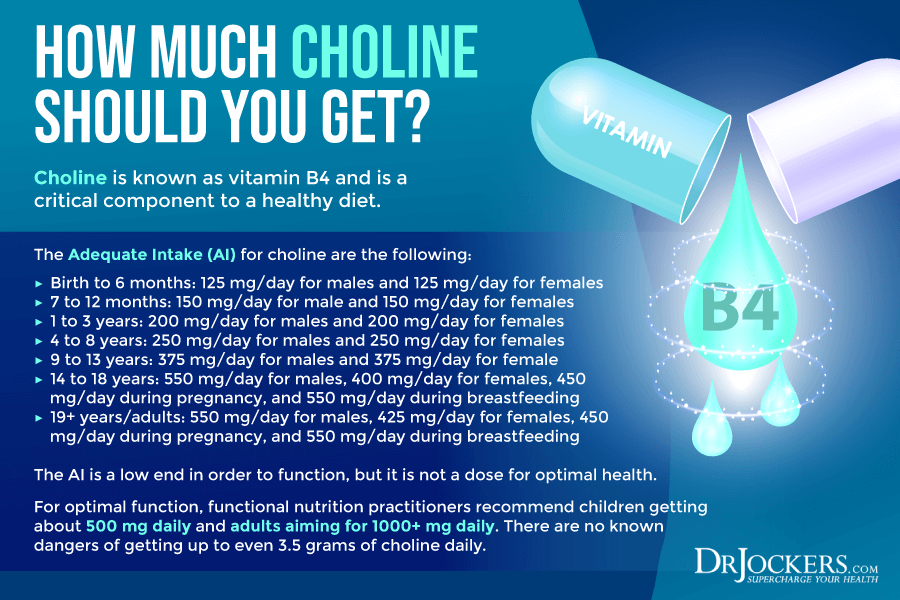
Best Food Sources of Choline
You can meet your choline needs through diet if you are following a balanced diet with healthy sources of protein, including grass-fed beef, pasture-raised poultry and eggs, liver, and certain vegetables, including cauliflower, broccoli, and Brussels sprouts.
Certain beans and legumes also contain high amounts of choline. However, legumes can be difficult to digest for some people. Due to their higher carbohydrate content, they may not be right for you if you are following a ketogenic, carnivore, or other higher fat, lower carb diet.
Best food sources of choline include:
- Beef liver: 3 oz contains around 283 mg
- Chicken liver: 2.4 oz contains around 222 mg
- Fresh cod: 3 oz contains around 248 mg
- Salmon: 6 oz filet contains around 191 mg
- Chickpeas: 1 cup uncooked contains around 198 mg
- Split peas: 1 cup uncooked contains 188 mg
- Navy beans: 1 cup uncooked contains around 181 mg
- Eggs: 1 large egg contains around 147 mg
- Grass-fed beef: 3 oz contains around 78 mg
- Broccoli: 1 cup raw contains around 63 mg
- Turkey: 3 oz contains around 57 mg
- Chicken breast: 3 oz contains around 50 mg
- Cauliflower: 1 cup raw contains around 47 mg
- Goat milk: 1 cup contains around 39 mg
- Brussels sprouts: 1 cup raw contains around 17 mg
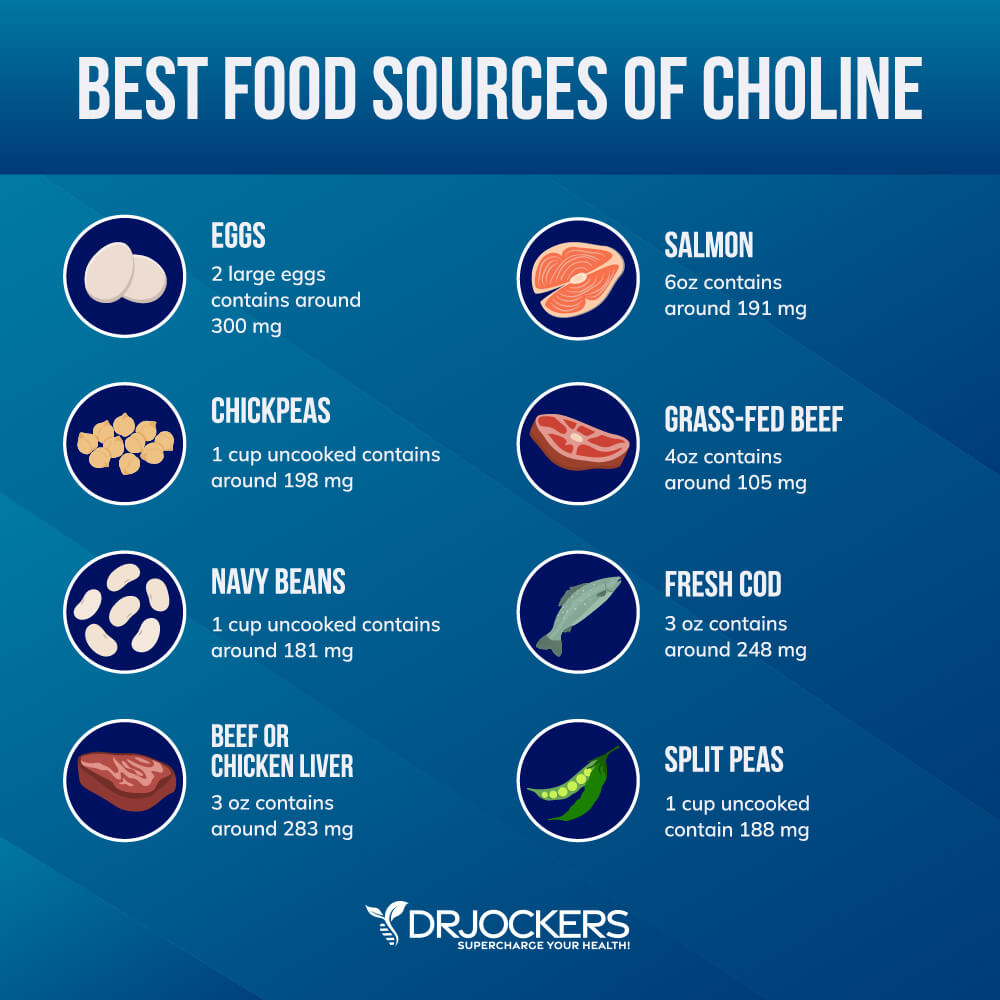
The PEMT Gene and Choline
Phosphatidylethanolamine N-methyltransferase or PEMT for short, is a gene that encodes the enzyme that helps to convert phosphatidylethanolamine (PE) to phosphatidylcholine (PC) through methylation in your liver. After this conversion, PC can release choline to improve your body’s choline levels.
PEMT is mostly expressed in your liver and plays an important role in PC production and healthy liver choline levels (25, 26). A 2003 study published in The Biochemical Journal found that mice that were deficient in PEMT had low choline levels despite a choline-rich diet and supplementation (27).
According to a 2007 randomized controlled trial published in the American Journal of Clinical Nutrition, younger, premenopausal women are less likely to develop choline deficiency-related fatty liver disease (28). This happens because estrogen levels drop after menopause.
Estrogen levels support PEMT activity and choline levels. During pregnancy and breastfeeding, when estrogen levels are high, PEMT activity supports a high choline supply to support the development of the baby (29, 30).
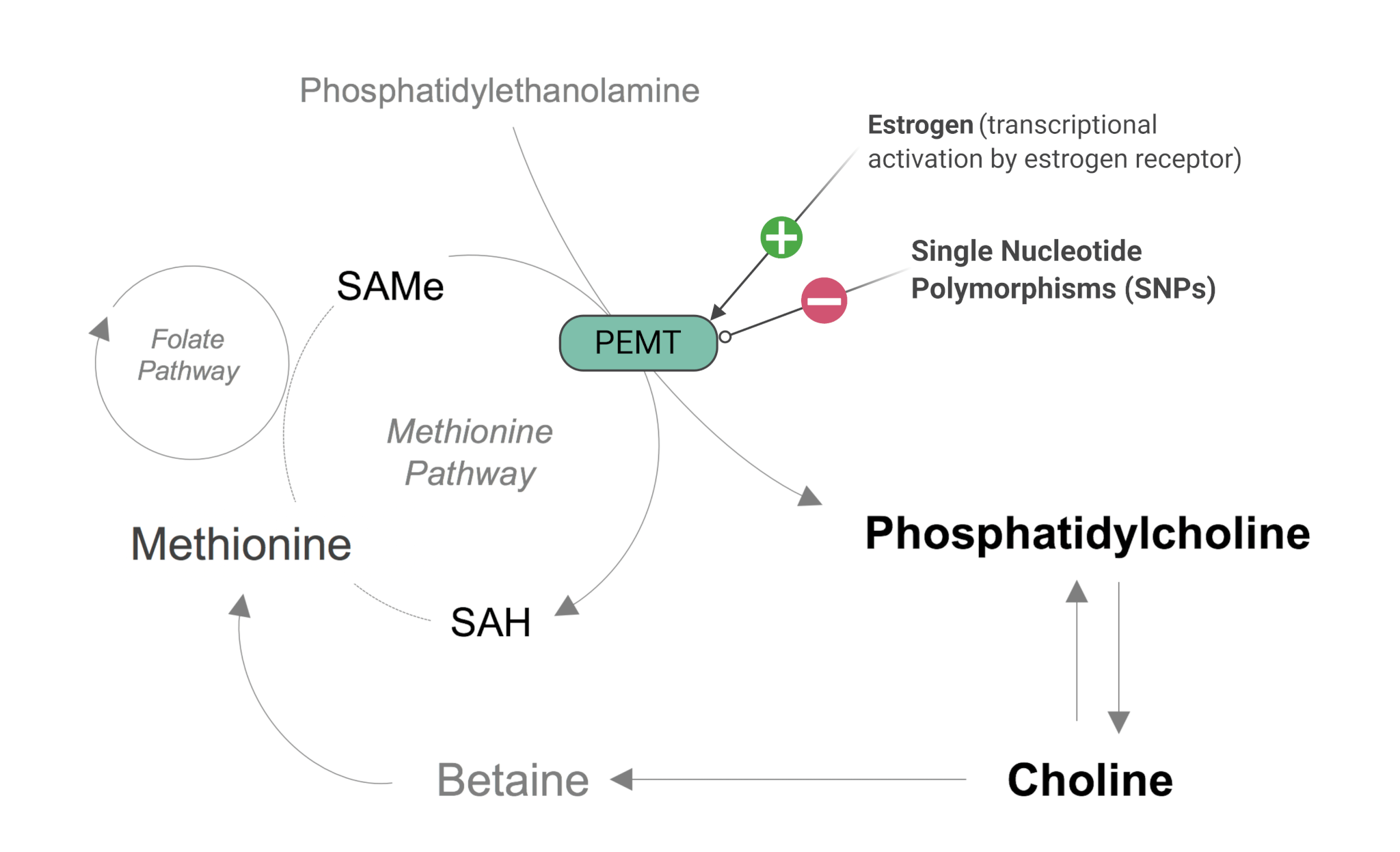
Certain PEMT variations are more likely to be associated with choline deficiency. A 2006 study published in the FASEB Journal has found that the rs12325817 PEMT variation is strongly linked to choline deficiency and women with a “G” allele have a 25 times higher likelihood of developing organ damage due to a low-choline nutrition plan (31).
They found that postmenopausal women were more likely to have this issue. The impact of this variation is much lower for pre-menopausal younger women and men.
A 2014 study published in the FASEB Journal has linked rs464643-T, rs3760188-T, rs1531100-A, and the rs4646365-T variants may also be linked to choline deficiency, but at a weaker level than the rs12325817 PEMT variation (32).
The latter two variants were only significant in post-menopausal women. A 2005 study published in the FASEB Journal has also linked the rs7946-T PEMT variant to low choline levels and related fatty liver disease (33).
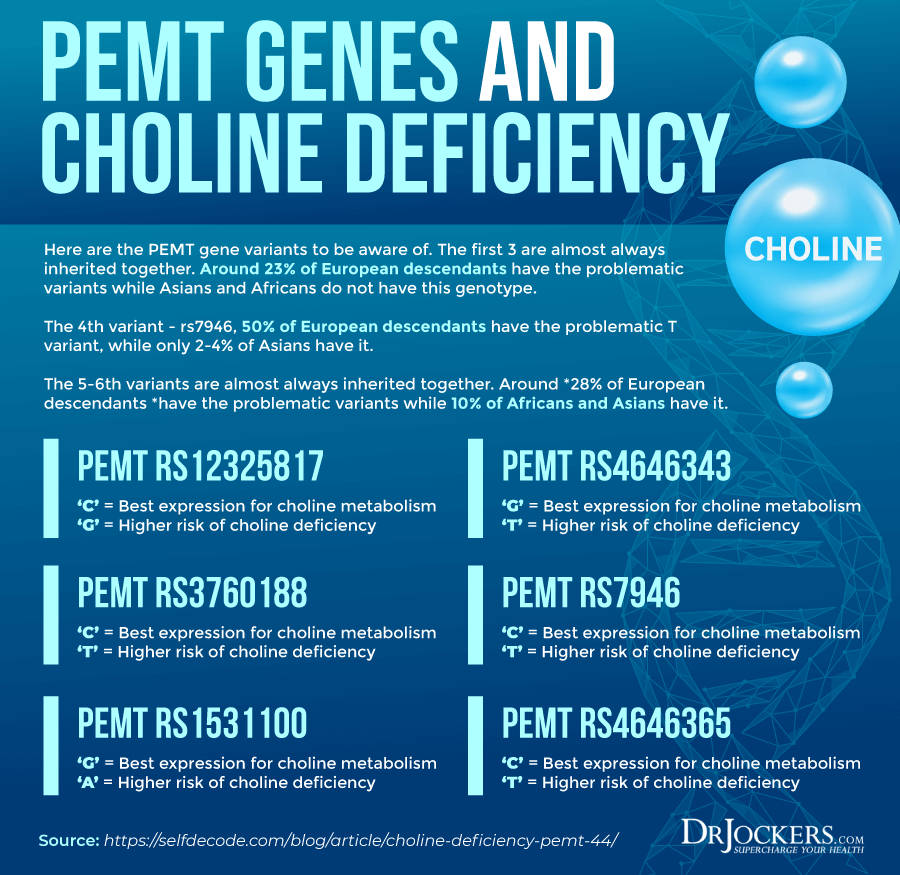
Gut Health and Bioavailable Choline
According to a recent study by Dr. Federico Rey from the University of Illinois, your gut microbiome may play an important role in your choline levels (34). Researchers used so-called gnotobiotic mice, which were colonized with a known community of microbes. For one group of mice, they used 5 specific microbes that are very commonly found in a healthy human gut microbiome, as well as a strain of E. coli bacteria.
One of the qualities of E. coli is metabolizing choline. For the other group, they used the same bacteria, except an enzyme on the same strain of E. coli was mutated to affect its ability for choline metabolism. Basically, this group was unable to metabolize choline, while the other group of mice was.
They collected blood samples to look at the choline levels of mice. Not surprisingly, the mice with the regular E. coli bacteria had much lower levels of serum choline than the group with the modified E. coli enzyme. They also noted that the group with the regular E. coli bacteria and lower choline levels also had reduced levels of DNA methylation, which is often seen in choline deficiency. This group also had higher blood triglyceride and circulating leptin levels. They were more likely to develop fatty liver. When pregnant, these mice with lower choline levels also had more obsessive grooming habits, and their offspring had higher levels of anxiety.
This research clearly shows that your gut bacteria and gut microbiome can affect choline bioavailability and, in some cases, may contribute to choline deficiency and related issues. Additionally, it’s important to note that the E. coli strain used in the group with lower choline levels is also known for colonizing the small intestines. Your small intestine is a primary place for nutrient absorption; thus, if it’s affected by an overgrowth of bad bacteria, it can turn into an issue. In small intestinal bacterial overgrowth (SIBO), bad bacteria end up competing for nutrients and may impact nutritional absorption of iron, vitamin B12, and choline.
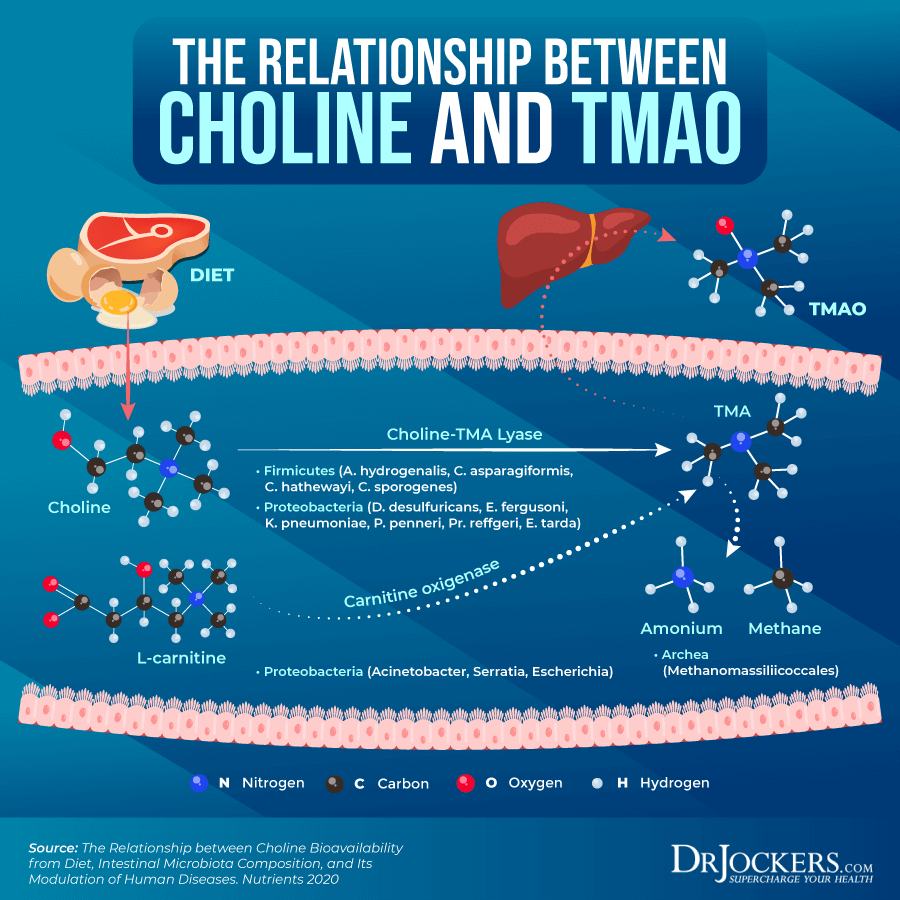
Choline bacterial metabolism can also cause increased levels of trimethylamine N-oxide (TMAO). According to a 2017 study published in the Journal of Cellular and Molecular Medicine, TMAO has been linked to cardiovascular disease (35). Your gut microbiome and the types of gut microbes you have can affect your serum TMAO levels. Certain bacteria may convert choline into TMA, which can later turn into TMAO when oxidized by your liver.
In the study by Dr. Rey’s lab, the mice with regular E. coli and lower choline levels had higher levels of TMAO, while the modified E. coli with higher choline levels had low levels of TMAO (34). Their study suggests that low serum choline levels may be linked to higher TMAO, and higher choline levels are associated with lower TMAO levels. This suggests that TMAO is not only coming from leftover excess choline in your colon, but increased TMAO levels may be connected to SIBO.
This may also explain a potential link between SIBO and cardiovascular disease. According to a 2017 study published in PLoS One, TMA can only be absorbed in your small intestine, and using an acute dose of rifaximin can decrease TMAO levels (36). Rifaximin is a non-absorbable antibiotic often used for SIBO. Since it may be effective for TMAO, it further supports the connection between your gut microbiome, SIBO, TMAO levels, and choline levels.
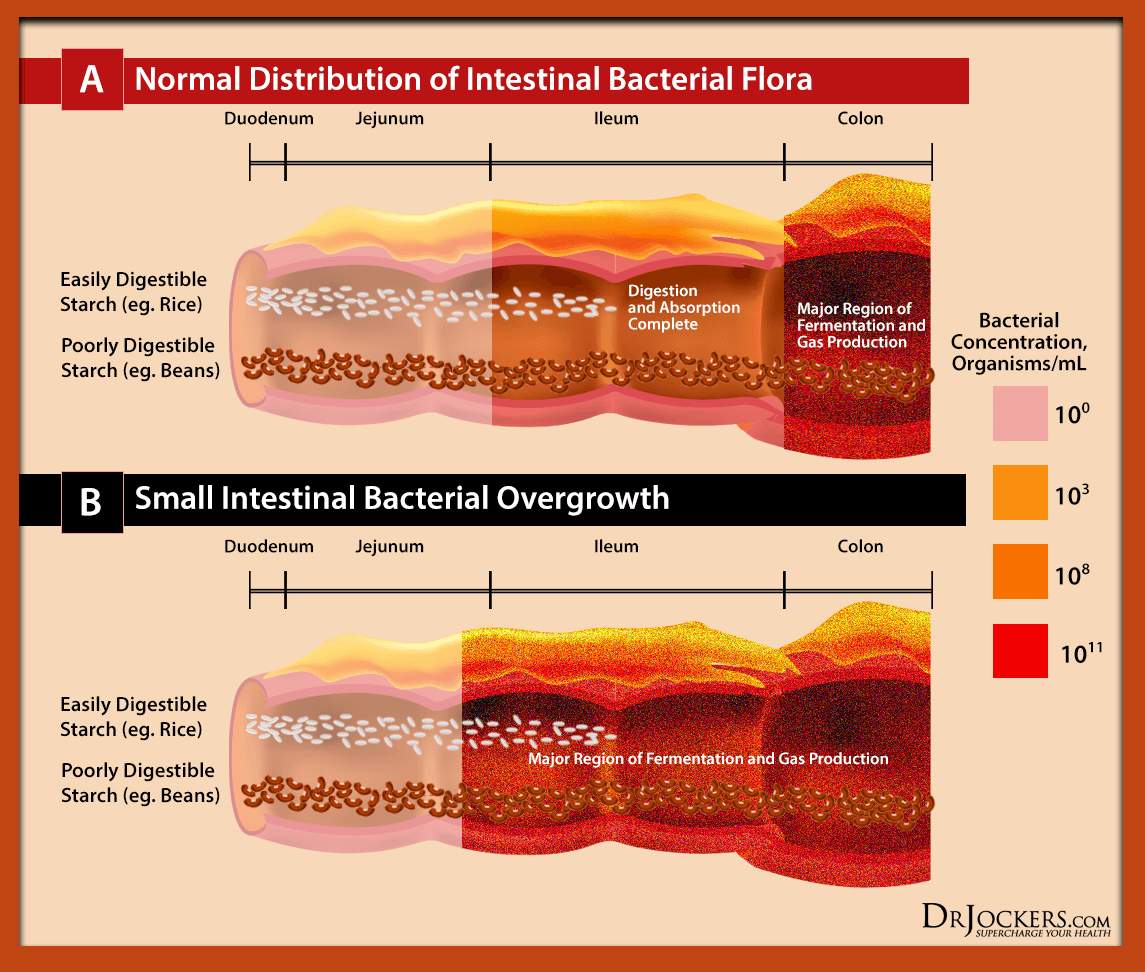
The Betaine – Choline Relationship
Betaine HCL is commonly used for low stomach acid, but it may also reduce the risk of symptoms from choline deficiency. One of the major roles of choline is being a methyl donor. A requisite for this role is the conversion of choline to betaine. This means that choline is not a direct methyl donor, but when converted to betaine, betaine is a direct methyl donor.
Choline has many other functions besides methylation, so betaine supplementation cannot completely make up for low choline levels. However, betaine may help to reduce the risk of certain epigenetic outcomes of choline deficiency.
According to the 2019 book, Biochemical, Physiological, and Molecular Aspects of Human Nutrition, betaine may be consumed by microbes and increase TMAO production (36). It is also absorbed in the upper part of your small intestine, compared to choline, which is absorbed in the lower portion of your small intestine.
SIBO more commonly affects the lower portion of your small intestine. This means that while SIBO may affect your choline levels, it may be less likely to affect betaine. However, we need more research to completely understand this claim.
Betaine HCL is commonly used for low stomach acid, but it seems that it may also help to counterbalance bacterial choline metabolism caused by SIBO and reduce the risk of symptoms of choline deficiency. Using both betaine and choline may also increase your chances of at least one of these nutrients getting absorbed properly.
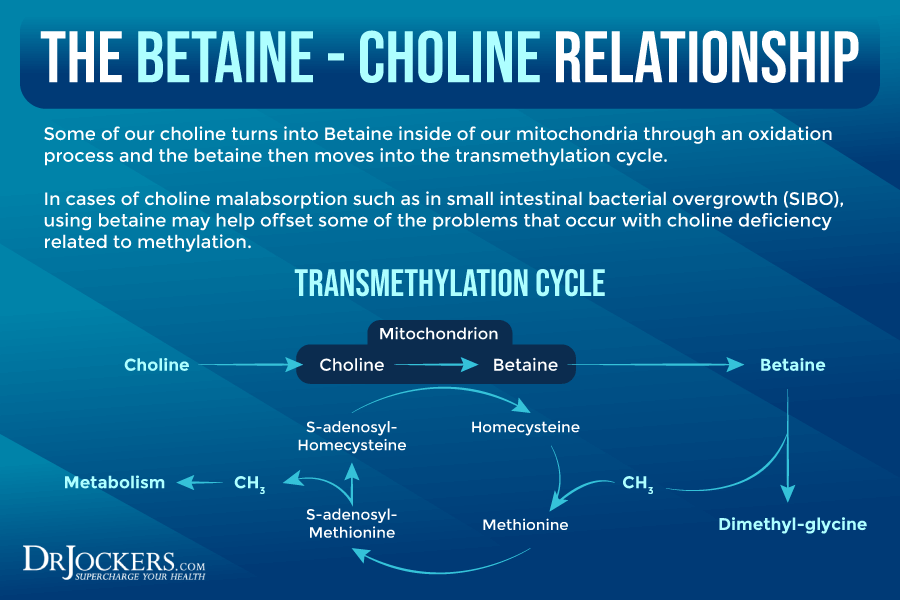
Best Supplemental Sources
Following a nutrient-dense diet with plenty of choline-rich foods, improving the gut microbiome, and treating potentially underlying SIBO are critical for optimizing your choline levels. However, food alone is not always enough. If you want to optimize your levels through supplementation, I recommend the following supplemental sources of choline:
Grass-Fed Beef Organ Supplements
Edible offal and organ meats are one of the most nutrient-dense food groups. Compared to skeletal muscle meat, organ meats are known to store and contain higher amounts of proteins and other key nutrients. These vital nutrients include important energy-producing compounds, enzymes, beneficial fats, and amino acids.
Bovine liver contains a variety of micronutrients that support various biological processes in the body. This supplement supports your micronutrient levels and improves cellular energy, along with improving your choline levels. I recommend taking 3 capsules twice a day with meals.
Now, I already know that most people will not introduce liver to their diet regularly, so my team and I researched and found the very best pasture-raised beef liver and full organ complex on the market, and we recommend it for people looking to support and improve their liver health.
I also like the Women’s Vitality as one of the best female-specific blends of 12 organs and glands, including adrenal and thyroid, to support healthy bones, hormones, energy, and more. This blend combines organs, glands, and superfoods designed specifically to support women’s liver, thyroid, and adrenal health.
For males we have the Male Performance. This blend combines organs, glands, and superfoods designed specifically for men’s performance and vitality. That means bovine and ovine liver, heart, adrenals, prostate, orchic (testicular), pituitary, and more.

Bile Flow Support
Choline is critical for liver health (20). Bile is a digestive fluid made by your liver. and stored in a concentrated form within the gallbladder. Bile’s main digestive responsibility is to emulsify fats and create fatty acids that can be readily absorbed and used by the body. When the body has metabolic problems that lead to poor bile production and utilization it can cause serious health disturbances and gallbladder disease.
I recommend using this Bile Flow Support supplement to support your liver health. It is a specialized liver support formula that provides nutrients involved in bile flow and fat metabolism, including choline, taurine, and methionine. Dandelion and celandine have been selected to support bile flow and healthy liver function.
Guggul extract and inositol hexanicotinate are included to support healthy blood lipid levels already within the normal range. This supplement supports bile flow, liver health, lipid metabolism, cholesterol levels, and cardiovascular health. I recommend taking capsules twice daily after meals, or as directed by your healthcare practitioner.
Sunflower Lecithin
Sunflower lecithin is a natural emulsifier because of its phospholipid content. It is very rich in choline and B vitamins. It helps to support your nervous system and other important bodily functions.
I recommend this Organic Sunflower Lecithin Powder. This powder is full of vitamins, minerals, essential fatty acids, and protein. I recommend taking one scoop a day between or during meals.
Final Thoughts
Choline is essential for your brain development, brain development, nervous system function, muscle movements, metabolic function, skin health, and cellular health. A deficiency may lead to fatigue, memory loss, cognitive decline, mood disorders, muscle aches, and other symptoms. I recommend trying the 3 best supplemental sources in this article to improve your choline levels and support your health.
If you want to work with a functional health coach, I recommend this article with tips on how to find a great coach. On our website, we offer long-distance functional health coaching programs. For further support with your health goals, just reach out—our fantastic coaches are here to support your journey.

Inflammation Crushing Ebundle
The Inflammation Crushing Ebundle is designed to help you improve your brain, liver, immune system and discover the healing strategies, foods and recipes to burn fat, reduce inflammation and thrive in life!
As a doctor of natural medicine, I have spent the past 20 years studying the best healing strategies and worked with hundreds of coaching clients, helping them overcome chronic health conditions and optimize their overall health.
In our Inflammation Crushing Ebundle, I have put together my very best strategies to reduce inflammation and optimize your healing potential. Take a look at what you will get inside these valuable guides below!
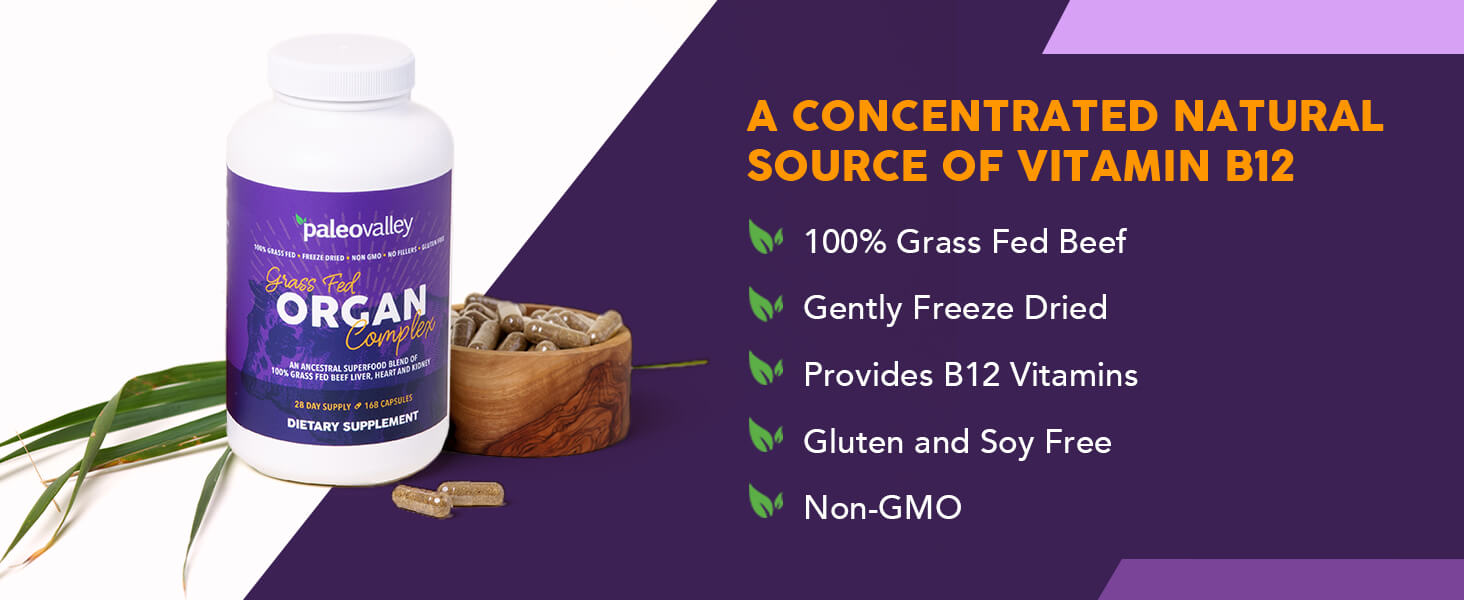





Good read here, thank you. What type of test is there for choline deficiency?
Thank you! At this time, I am not aware of a good test for choline deficiency. Instead, doctors may look at a combination of biomarkers, like increased liver and muscle enzymes (creatine phosphokinase, AST, ALT) or elevated homocysteine